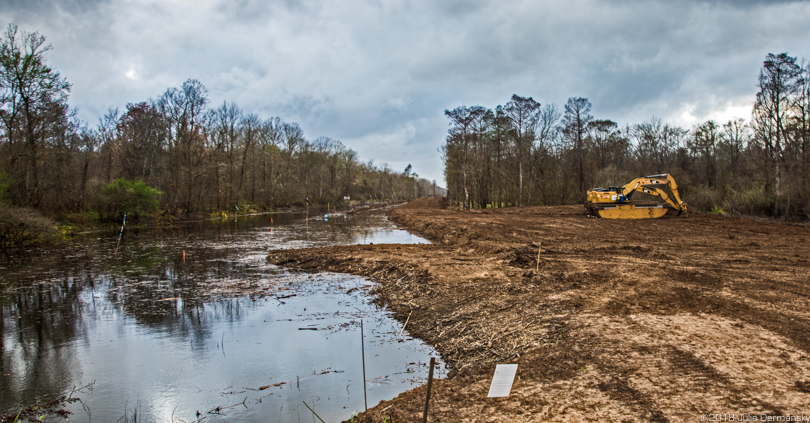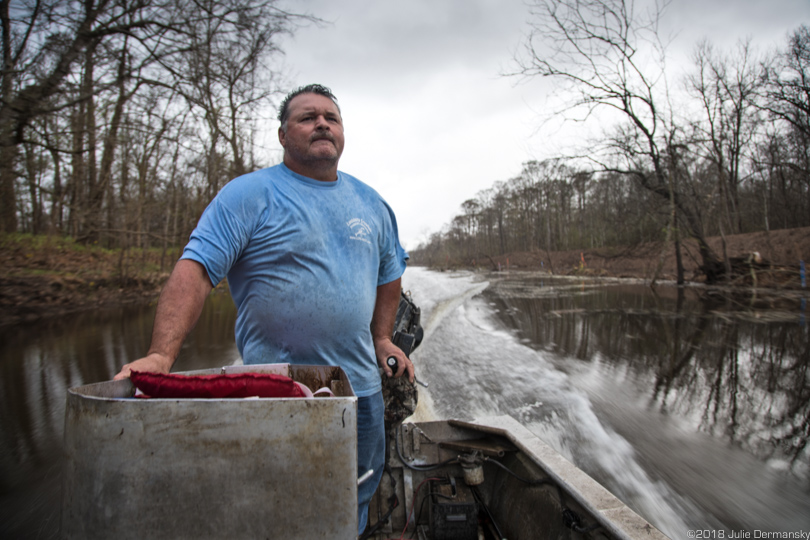Today the Fifth Circuit Court of Appeals reversed a federal judge’s temporary injunction halting work on the Bayou Bridge pipeline within Louisiana’s Atchafalaya Basin. In a 2-1 vote the higher court’s decision will allow construction to proceed while the company, Bayou Bridge Pipeline LLC, a subsidiary of Energy Transfer Partners, appeals the injunction.
On February 24, U.S. District Judge Shelly Dick, an Obama appointee, granted Earthjustice an injunction in order to prevent irreparable harm to the basin, an environmentally sensitive National Heritage Area, until the group’s lawsuit challenging a U.S Army Corp of Engineers permit for the pipeline could be heard.
Earthjustice had filed this lawsuit January 11 on behalf of the Atchafalaya Basinkeeper, the Louisiana Crawfish Producers Association-West, Gulf Restoration Network, the Waterkeeper Alliance, and the Sierra Club. The suit alleges that the Corps is not enforcing existing permits for oil and gas pipeline companies already operating in the basin, where pipelines, canals, and dredge piles traverse the country’s largest river swamp. According to the suit, the Corps acted “arbitrarily and capriciously” in issuing a permit for the Bayou Bridge pipeline.
Judge Edith Brown Clement, a George W. Bush appointee, wrote in today’s decision that the “district court abused its discretion in granting a preliminary injunction” blocking pipeline work in the basin. Instead, she wrote, “the district court should have allowed the case to proceed” and sought more information from the Army Corps of Engineers justifying why it granted the permit in the first place.
“We are pleased with the 5th Circuit’s Ruling today,” Energy Transfer Partners said in a statement. “We will begin mobilizing for construction activities as soon as possible, and will do so in full compliance with all permit conditions.”
One the three judges on the appeals court — Eugene Davis, a Reagan appointee — filed a dissent, stating he agreed with the district court that the Army Corps had violated the law in issuing the permit.
Atchafalaya Basinkeeper’s Misha Mitchell said she didn’t feel completely defeated by the decision. “Though it is a disappointment that the injunction was lifted, the fact we got a temporary injunction was a big win,” she told me shortly after the ruling was made. “It means that our strides to protect the basin are being taken seriously and that alone is a victory.”
The Bayou Bridge pipeline is the last leg of Energy Transfer Partners’ Dakota Access pipeline, which begins in North Dakota. This portion will span 162.5 miles from Lake Charles to St. James, Louisiana, and, if the Corps’ permit is not revoked, will cut through the Atchafalaya Basin, a productive area for commercial crawfishers.
“Mother nature might stop construction if the injunction won’t,” said Jody Meche, president of the Louisiana Crawfish Producers Association-West. He can’t fathom how the company would be able to work in the flooded basin even with the legal go-ahead. “This is not political. It is common sense.” he said.
Jody Meche assesses the state of pipeline construction through the Atchafalaya Basin a day after a judge granted an injunction halting work.
Meche told me that the water in the basin has risen about 14 feet since February 25, the day after work was stopped, when he and I traveled there to see how far construction had progressed. At that time, Meche predicted the dirt construction crews had piled along the pipeline route would be washed away, injunction or no injunction, because nothing was going to stop the rising water.
“It is ridiculous they would even consider going forward with the installation in the basin now,” Meche said. “It means they have no understanding of the dynamics of the water coming through.”
The forecast for the next several days is heavy rain.
Meche mused that perhaps the water level will go down enough to resume work on the pipeline by the time their original lawsuit is heard. That would be at the end of April at the earliest, he told me.
“You know that phrase ‘April showers bring May flowers?’ Meche asked. “It isn’t even April and we are above flood stage.” In his view, conditions may make it impossible to install the pipeline safely until the end of June. “Working now would be precarious, with a fast current.”
Mitchell concurred with Meche about the potential challenges of trying to install the pipeline with water levels so high. She said, depending on the specifications of the permit, she isn’t even sure the Corp will allow construction to resume at this point.
Ironically, climate change may be a factor working against the Bayou Bridge pipeline now. More water is coming down the Mississippi River from heavy rains in the north, and an uncertain spring lies ahead, with water levels already running higher than usual.
Meanwhile, Energy Transfer Partners’ safety record continues to worsen since the environmental groups filed their lawsuit.
“In the first 11 weeks of 2018, [Energy Transfer Partners] has been hit with 36 violations and $12.8 million in proposed fines by federal and state regulators for their repeated failures to comply with regulations and laws designed to prevent spills, explosions, fires, loss of life and to ensure the public safety of their oil and gas operations and pipeline construction operations in multiple states,” wrote Waterkeeper Alliance’s Donna Lisenby after the ruling.
“We will continue fighting to hold this reckless company accountable for its weekly acts of water pollution and harm to communities.”
Meche still holds out hope the pipeline can be stopped. And if it isn’t, he says, at least he and others are taking a stance to protect their heritage in the Atchafalaya Basin.
Main image: The empty construction site for the Bayou Bridge pipeline through the Atchafalaya Basin February 25, the day after a district judge granted an injunction halting work. Credit: Julie Dermansky
Subscribe to our newsletter
Stay up to date with DeSmog news and alerts








